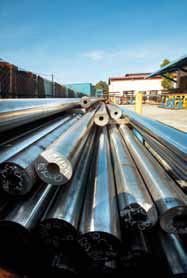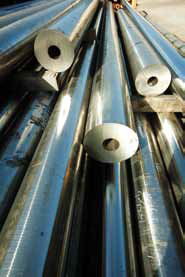
![]() Schoeller-Bleckmann is committed to on time delivery of high quality products continually seeking both cost reductions and technological improvements
Schoeller-Bleckmann is committed to on time delivery of high quality products continually seeking both cost reductions and technological improvements
The company's core values are efficiency, commitment to quality and flexibility to meet customer demands.
Schoeller Bleckmann Non-Magnetic Drill Collars are manufactured with higher contents of Chromium, Molybdenum, Nitrogen and other alloy elements to increase pitting corrosion resistance and stress corrosion resistance.
Pitting Corrosion Test Procedure
The test specimen is tested in a test cell at a controlled temperature (20°C/68°F) and in a test solution of chlorides (e.g. 1000 ppm CI). The test temperature and the chloride content of the test solution are principally variable.
The measurement of the Pitting Corrosion Potential of the specimen is carried out against a reference electrode (Kalomel-Electrode_. The steady increase in the applied potential is regulated by a motor potentiometer. The amount of increase of the potential is given with 150 mV/hr (comparable ASTM G5/87: 720mV/hr).
The Potential at which first a deviation from a constant current level can be examined is stated as the "Pitting Corrosion Potential".
Stress Corrosion Resistance
All Schoeller-Bleckmann Non-magnetic materials basically show a very good resistance against stress corrosion. For the application of these materials in high chloride muds a surface treatment as an additional protection against stress corrosion is strongly recommended.
Schoeller Bleckmann provides following special processes to apply a uniform compressive surface layer:
- Hammer Peening
- Roller Burnishing
- Shot Peening
Tests carried out on each bar during production of drill collars & MWD-Parts
- Tensile Test
- Impact Test
- Hardness Test
- Metallographic Test (grain size)
- Oxalic Acid Test (acc. To ASTM A262 – Pract.E)
- Ultrasonic Test over whole length of the bar
- Probe Test over whole length of the bar
Tests carried out on each melt
- Chemical Analysis Relative Magnetic Permeability
Standard Certification Package
- Certification Sheet
Ultrasonic Report
Probe Testing Report

Additional reports based on product (mainly for MWD / LWD – Parts)
- Dimensional Report
Surface Treatment Report
Welding Report
Magnetic Properties
- Relative Permeability : ≤1.001
Corrosion Resistance
-
-
Transgranular SCC
Prevented by special surface treatments ("PLUS" treatment, roller burnishing, shot peening)
-
Intergranular SCC
Quenching after warm forging prevents the occurrence of material sensitization. Each collar is tested according to ASTM A 262, Pract.A and E latest edition.
-
Transgranular SCC
Non-Destructive Testing
-
Magnetic Inspection
Drill collars are 100% tested by a proprietary probe-testing process ("Hot Spot" – test).Magnetic permeability of each collar is certified with the printout of probe testing.
-
Ultrasonic Inspection
Each collar is ultrasonically inspected accordingly to ASTM E 114, latest edition as a minimum level.
